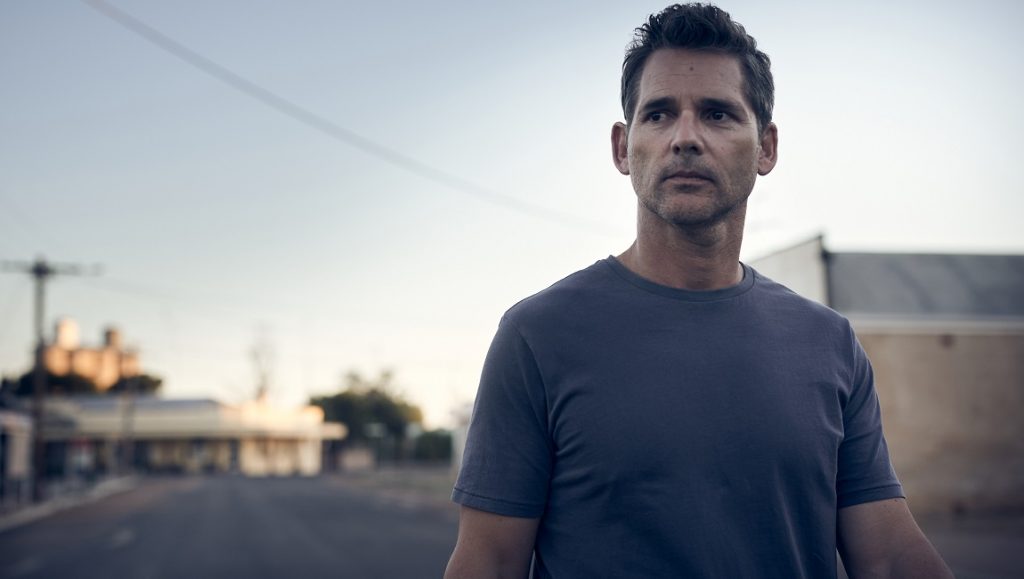The Dry perhaps ends too tidily, but it remains a welcomingly straightforward and visceral thriller that plays fair with its audience.
Robert Connolly’s The Dry begins with aerial shots of a barren, wasted landscape, rows upon rows of dead farmland stretching across the horizon. The jagged geometry of the sun-blasted terrain leads to an isolated home, where the camera creeps inside to reveal blood-spattered walls, corpses, and a wailing baby (very much alive, thankfully). Into the aftermath of this tragedy arrives Aaron Falk (Eric Bana), a big city Federal agent who has roots in this small community in rural Australia. He’s come at the behest of a cryptic note, which reads simply “you lied, Luke lied,” and which leads to the uncovering of long-buried secrets.
The local authorities have ruled the crime an open and shut case of murder/suicide, declaring that Luke Hadler (Martin Dingle-Wall) shot his wife Karen and son Billy, before then turning the gun on himself. Luke’s parents don’t believe their son could commit such a heinous crime, and so rope Aaron into reopening the case on his own. While Aaron reacquaints himself with the area, where he hasn’t been since leaving for Melbourne as a teenager twenty years earlier, he meets old friends and some incensed folks eager to see him leave just as quickly as he’s arrived. In a structural gambit that will continue for the length of the film, Connolly inserts numerous flashbacks, first briefly but gradually accumulating into an entire parallel narrative. Here, young versions of Aaron (Joe Klocek) and Luke (Sam Corlett) are revealed to be best friends who pal around with classmates Gretchen (Claude Scott-Mitchell) and Elle (Bebe Bettencourt), enjoying a seemingly carefree summer of swimming and camping and underage drinking. But the troubled Elle dies under mysterious circumstances, leading to Aaron’s departure, and is still a point of contention amongst the locals all these years later. Connolly doles all of this out in small snippets of elliptical images; that Aaron was suspected of foul play, and that he and Luke crafted an alibi together, sparing them further police scrutiny but infuriating Elle’s violence-prone father. And so the narrative alternates along these two timelines, creating layers upon layers of suspects and motives. Were young Aaron and Luke involved in a murder together, or perhaps separately, and if so, would the adult Luke actually be capable of slaughtering his own family? Truth, in either timeline, remains elusive.
Beyond the scope of its mystery/thriller components, Connolly paints a damning portrait of this crumbling small town. Everyone knows everyone else, and ancient history continues to fester like an open wound. Aaron reconnects with the adult Gretchen (Genevieve O’Reilly), who seems to be the only person from his past who’s happy to see him. In a refreshing change of pace, local cop Raco (Keir O’Donnell) also welcomes Aaron’s presence, eager to work with an accomplished investigator. There’s also the principal of the public school where Karen worked, Scott Whitlam (John Polson), who brought his family to the middle of nowhere to flee the violence of the big city, only to find another kind of malevolence lurking. Everything here is brittle; at one point, someone informs Aaron that they haven’t had rain in over a year, and everywhere are tell-tale signs of a dead or dying place. Water comes out of the tap and from shower heads with an opaque amber hue, while fields as far as the eye can see are sickening shades of yellow and brown and burnt umber. When Aaron has to wash blood off of his car, he uses dirty, leftover wastewater. It’s all both a potent metaphor and a viscerally physical reality. As Aaron and Raco go about their sleuthing and uncover new details about the case, digging up a few local secrets in the process, it becomes increasingly clear that Luke might not be the culprit after all. Both the past and present-day stories eventually reach dramatic conclusions, and if the film has a flaw, it’s that every question posed is definitively answered, leaving little room for ambiguity or doubt. But in this age of seemingly endless streaming “content,” where simple mysteries are dragged out for multiple seasons with any number of cliffhangers and red herrings, it’s remarkably satisfying to view a straightforward thriller that plays fair with the audience. The Dry offers a compact, effective narrative, where the truth offers only brief respite from the pain and decay of everyday survival.


Comments are closed.